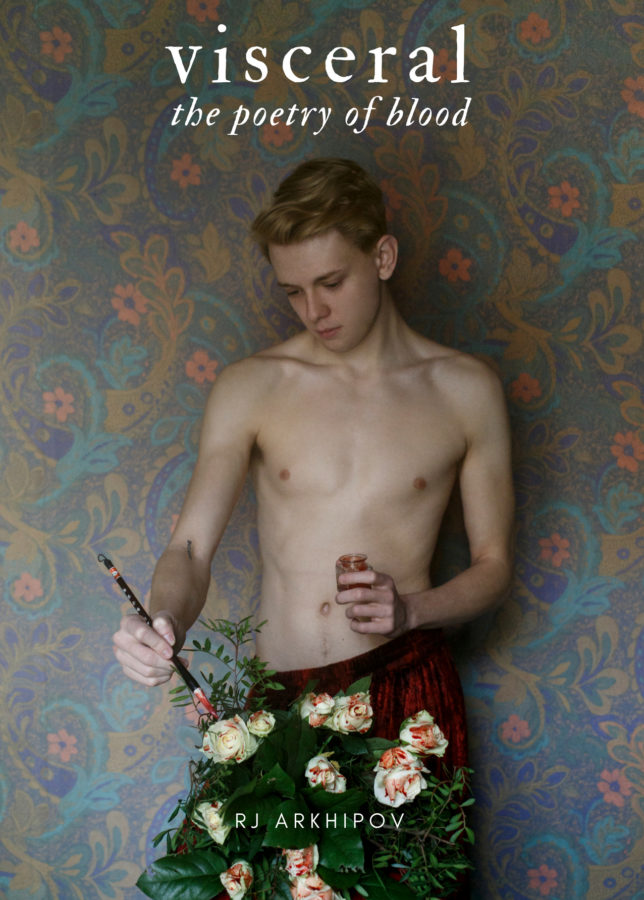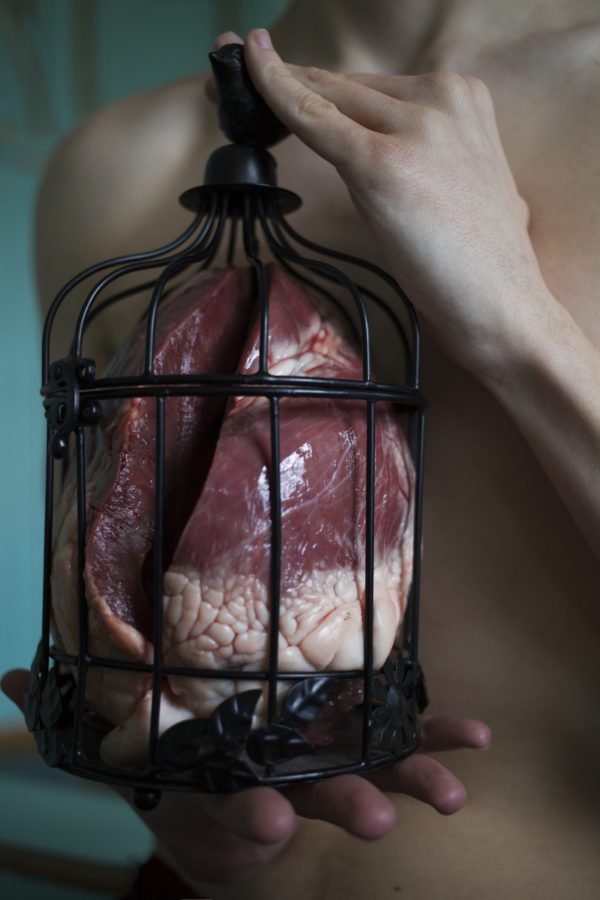RJ Arkhipov’s Visceral: The Poetry of Blood should be read and reread with the enthusiasm to produce paper cuts

Visceral: The Poetry of Blood (Maud Maillard)
Reading Visceral leaves me with a Schodinger’s Review conundrum. I’m in two completely different minds on how to approach the book, and I’m hoping that—in the course of writing this review—my divergent perspectives will collapse into something approaching a coherent opinion, but we’ll see how it goes.
One the one hand, this is the freshman collection of RJ Arkhipov. These are verses of the kind that poets have been binding together and passing around for something like 3,000 years. It’s a collection that examines love, sexuality, family and persecution, all through the universal thematic lens of blood. Blood relations, blood feuds, the heart’s blood, blood as injury, the innate traits that are in one’s blood.
On that basis, Visceral is a gorgeous collection that covers a deceptively broad array of subjects (deceptive, considering the thematic tightness suggested by the title).

Visceral: The Poetry of Blood (Maud Maillard)
It will not surprise anyone who has met the author to know that the poetry here is uncompromising, from its emotional honesty through to its proud, queer sexuality. The eroticism of “whiskey” is staggeringly effective and the playfulness of “O”—a concrete poem in concentric circles, which collapses its carnal verse down towards a gasping “o”—is a delight.
“xy” is an early highlight, exploring fluid conceptions of gender by means of an ocean view (“Extending, never ending before us / Whitened waters & quickened skies”), whilst “stargazing” provides a devastating portrayal of losing a loved one to dementia:
“and I remember
how the darkness stole you
dusk fell gentle painted
stroke by tenebrous stroke
and I remember
for you forgot somewhere
beneath that fragile night
of marcescent moon and mislaid stars
there is a boy remembering”
It’s bloody good stuff, in other words.
This all leads me to the other face of my Janus-like review, because of course Visceral is rather more than the traditional, Faber & Faber-style, thin volume of newspaper print verse. This is a glossy coffee table hardback. Here we have poetry, photographs and personal essays—there’s even a sculpture in there—it’s one of the most ambitious things that I’ve read in a while.
While the collection is unified by its specific concern with blood, Arkhipov splits his verse according to the various metaphoric aspects that blood has been given in our collective psyches. Blood as family; blood as life; blood as sex—the blood of God. Each section includes photographs and a personal essay from the author exploring the background and themes of the poems that follow.
When the essays work well, they make the poetry truly sing, granting just enough information to truly enrich the verse. This will probably outrage Death of the Author purists (death of the poet?), thinking that a good poem should stand alone, but that would rob much of this work of its intimacy.

Visceral: The Poetry of Blood (Maud Maillard)
The highlight of the collection (for this reader at least) comes in the second section, Ancestry, where Arkhipov narrates the story of his Russian grandfather, who escaped a German POW camp during the Second World War by stealing the identity of a Polish doctor.
By the end of the essay, it is clear just how significant the poet’s grandfather is to Arkhipov’s sense of self. The reader then immediately comes to the poem “inside”, subtitled “coming out to prisoner JV5057”. There is suddenly so much more emotional weight as you reach the opening lines:
“within these carnal confines, I
damned him to honesty
a sentence that would grant release
from bodily bastille
where my very limbs were limbo
my flesh, captivity…”
Whilst Arkhipov is an assured poet, he is a fledgling essayist, and the resultant output does vary in its effectiveness. I couldn’t help occasionally wishing that the editor had taken a firmer hand, just to bring out the poet’s thoughts a little more neatly.
Sometimes the essays read more like a thematic primer for ignorant readers than a thoughtful meditation by an author.
Still, it’s hard not to be impressed by the ambition of the work as a whole, and whilst some sections are more cohesive than others, the collection is really quite something when it’s firing on all cylinders.
The photographs, by French photographer Maud Maillard, largely depict the author in a queer fantasia—crossdressing, writing in his own blood, shirtlessly re-enacting Alice in Wonderland—mixing vaudevillian homoeroticism with the incongruously macabre. (Falling squarely in the latter category is one particular photograph of an actual heart in a literal cage—oh dear.)
Mostly it’s affecting, sometimes a tad more nuance would be appreciated, but the theatrical sensibility feels utterly at home amid Arkhipov’s lush, indulgent use of language (c.f. the above use of the word “marcescent”).
So, have my super-positioned opinions collapsed into a single answer? Apparently not.
If I’m reviewing the poetry, it’s great; if I’m reviewing the mad, crazy-ambitious collection as a whole, it’s still great, just with a few flaws showing.
Either way it should be bought, read and reread with enough enthusiasm to produce paper cuts—an outcome, given his theme, of which I’m sure the author would approve.
Visceral: The Poetry of Blood is available to purchase here.

